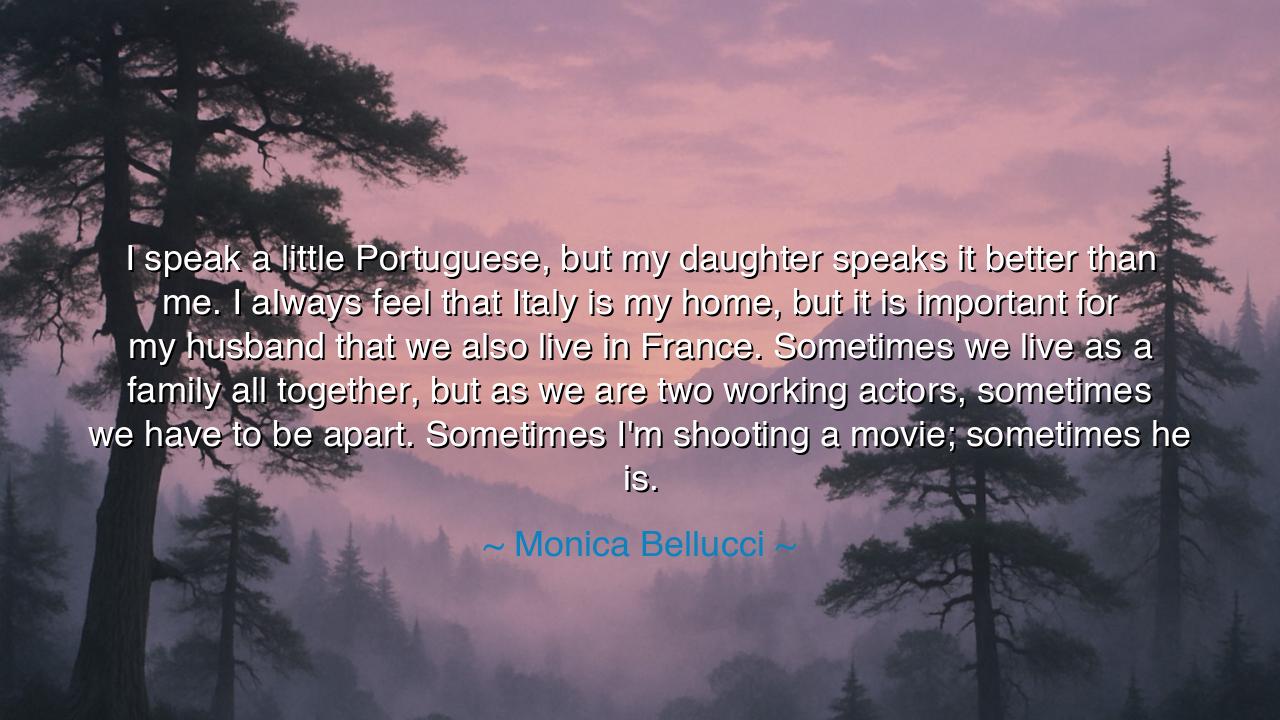
I speak a little Portuguese, but my daughter speaks it better
I speak a little Portuguese, but my daughter speaks it better than me. I always feel that Italy is my home, but it is important for my husband that we also live in France. Sometimes we live as a family all together, but as we are two working actors, sometimes we have to be apart. Sometimes I'm shooting a movie; sometimes he is.






In the tapestry of wandering hearths, Monica Bellucci threads a gentle truth: “I speak a little Portuguese, but my daughter speaks it better than me. I always feel that Italy is my home, but it is important for my husband that we also live in France. Sometimes we live as a family all together, but as we are two working actors, sometimes we have to be apart. Sometimes I’m shooting a movie; sometimes he is.” Hear the cadence—sometimes, sometimes, sometimes—like waves that leave and return. Her words name the modern pilgrim’s rhythm: languages crossing tongues, borders crossing hearts, careers crossing calendars, and love learning to breathe in the intervals.
First, the child becomes the bridge. “I speak a little Portuguese, but my daughter speaks it better.” This is the oldest miracle in a new house: the next generation receiving the river of culture more freely than the parents who carry the buckets. The mother knows a handful of syllables; the child drinks the spring. In this there is both humility and hope. The family’s map expands, not by decree, but by a small voice playing in two or three tongues, turning strangers into neighbors with a greeting.
Second, the soul keeps its compass. “I always feel that Italy is my home.” The word home here is not a postcode; it is a flavor of light, a grammar of streets, a melody of kitchens. Yet love is a covenant of two directions. “It is important for my husband that we also live in France.” So they bind two flags to one mast. The ancients would call this a double allegiance: not betrayal of one land, but stewardship of two. The heart remains Italian; the doorbell rings in French. And the household learns to bless both thresholds.
Third, the vocation asks its tithe. “We are two working actors… sometimes we have to be apart.” This is the craft’s weather: rehearsals that keep dusk long; sets that keep dawn early; scripts that keep continents between two chairs. To be shooting a movie is to borrow a city as a workshop and to surrender evenings that other families spend in the same room. The cost is real. Yet the work is also a gift—stories that feed other homes, faces that carry courage to strangers. The wisdom is to acknowledge both: the ache of distance and the dignity of purpose.
Let a true story mirror this path. Ingrid Bergman moved between nations and languages—Sweden, Italy, America—her art a bridge, her private life a sea crossed often. She learned the grammar of absence: letters, visits, negotiated seasons. Critics spoke loudly; history, more patient, remembers a woman who kept faith with her craft while striving to keep faith with her kin. Her life teaches what Bellucci’s line affirms: when love, place, and calling pull in different directions, integrity is not a static pose but a practiced dance—apology when needed, boundaries when necessary, tenderness always.
There is also the older parable: Penelope and Odysseus, love plaited with long journeys. Though mythic, their lesson is practical: constancy is not merely waiting; it is weaving. While one sails, the other keeps the hearth, not as a prison but as a lighthouse. When roles reverse, the light is passed like a torch. In such households, the word sometimes stops sounding like loss and starts sounding like tempo—one plays melody, the other plays harmony, and the song survives the miles.
What, then, is the teaching we hand to our children from these lines? That a family can be both rooted and roaming; that home can be plural without being diluted; that love grows stronger, not weaker, when it honors each person’s calling. Languages are not rivals; they are ladders. Countries are not jealous; they can be companions if we let gratitude, not anxiety, write our passports. And separation, endured with care, can become a kiln in which trust hardens into something durable.
Practical rites for travelers between nations and sets: (1) Make a family lexicon—shared phrases in Italian, French, and Portuguese—so affection has many doors. (2) Establish a “moving altar”: a small object or photo that travels to every dwelling, consecrating each rental as home. (3) Write a calendar covenant—who travels when, how long, with what rituals of return (weekly calls, bedtime stories, mailed notes). (4) Treat sometimes as a rhythm: when one is shooting a movie, the other becomes the keeper of ordinary joy; then exchange without resentment. (5) Celebrate the child’s fluency—let the daughter teach; let the parents become students—so pride replaces distance. Do these things, and the family will discover that love, like a well-acted scene, is not a monologue but a chorus—many voices, one meaning, carried across borders on the breath you share.






AAdministratorAdministrator
Welcome, honored guests. Please leave a comment, we will respond soon